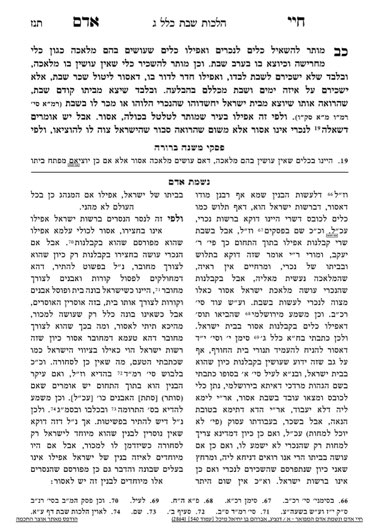We are continuing in siman 22, discussing the issues involved in a non-Jew using a Jew’s item on Shabbos. We learned that even though it is muttar for the non-Jew to use a Jew’s item on Shabbos, the non-Jew cannot remove the item from the Jew’s home on Shabbos itself due to chashad. We learned that there three understandings to the chashad, either that it appears the Jew is selling the item to the non-Jew on Shabbos, lending the item to the non-Jew on Shabbos, or because it looks like the Jew instructed the non-Jew to carry the item on Shabbos. The Chayei Adam clarified that if there is an eruv, the third understanding does not apply, but the first two apply.
The Chayei Adam continues, and writes that the chashad concern above was that it appears that he was renting an item to a non-Jew on Shabbos. Let us explain.
Theoretically,one may lend an item to a non-Jew. Although we use the word lending interchangeably in English for both halva’ah and she’eilah, they are not the same. We see the difference in how the item is paid back. When a person borrows, for example, egg, flour or money, it is understood that a different item will be paid back. When a person lends, for example, a car or lawnmower, one must return the actual item.
In Lashon Hakodesh, an item meant to be consumed is called a halva’ah, while an item expected to be returned itself is called she’eilah. Often, a halva’ah also includes some form of interest.
Thus, the Chayei Adam is saying that a halva’ah is assur on Shabbos itself. This issur is a takana derabanan, out of a concern that it would be written down. Chazal understood that it was more likely for people to write down a halva’ah, because it is consumed and therefore takes longer to pay back. However, she’eilah is permitted. Even so, if the non-Jew walks out of the Jew’s house with the item, even if it was only she’eilah, people may think they did a halva’ah.
Nevertheless, since there are different explanations as to the chashad, and since one of the opinions is that the chashad does not apply when there is an eruv, one may rely on that understanding of the chashad and allow a non-Jew to remove an item from a Jew’s house, in a situation of necessity.
Until now, we have been discussing renting or lending items which are not used for a melacha. The Chayei Adam writes that an item which is used for melacha should not be rented to the non-Jew on Friday. He explains that since the Jew is getting paid for the rental, it is as though the non-Jew is working for the Jew. If it is a she’eilah, this concern does not apply and it is muttar for the non-Jew to take the item on Friday (but still assur on Shabbos due to the concerns above).
Summary
- A Jew can give or rent his items to a non-Jew for use over Shabbos.
- Even If the item is not used for melacha, the non-Jew cannot take the items out of the Jew’s property on Shabbos itself, and any profits made by the Jew must be received through havla’ah.
- In cases of necessity, the non-Jew may remove the item from the Jew’s property on Shabbos itself.
- If the item is used for melacha, and the non-Jew is taking the item as a rental, the non-Jew must take the item before Friday. If it is being taken as a she’eilah, it may be taken on Friday.



